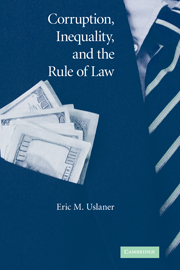Book contents
- Frontmatter
- Contents
- Preface
- 1 Corruption: The Basic Story
- 2 Corruption and the Inequality Trap
- 3 Corruption, Inequality, and Trust: The Linkages Across Nations
- 4 Transition and the Road to the Inequality Trap
- 5 The Rocky Road to Transition: The Case of Romania
- 6 Half Empty or Almost Full?: Mass and Elite Perceptions of Corruption in Estonia, Slovakia, and Romania
- 7 The Easy and Hard Cases: Africa and Singapore and Hong Kong
- 8 Corruption Isn't Inevitable, But …
- 9 Conclusions
- Appendix
- References
- Index
8 - Corruption Isn't Inevitable, But …
Published online by Cambridge University Press: 27 July 2009
- Frontmatter
- Contents
- Preface
- 1 Corruption: The Basic Story
- 2 Corruption and the Inequality Trap
- 3 Corruption, Inequality, and Trust: The Linkages Across Nations
- 4 Transition and the Road to the Inequality Trap
- 5 The Rocky Road to Transition: The Case of Romania
- 6 Half Empty or Almost Full?: Mass and Elite Perceptions of Corruption in Estonia, Slovakia, and Romania
- 7 The Easy and Hard Cases: Africa and Singapore and Hong Kong
- 8 Corruption Isn't Inevitable, But …
- 9 Conclusions
- Appendix
- References
- Index
Summary
Hark! Hark! Hark! Hark! Hark! Hark!
Victorious messenger riding comes, riding comes, riding comes….
In view of her coronation, Her Majesty has decreed that the prisoner Macheath forthwith be freed. (Hurray!)
Also of this moment he receives the rank of Knight of the Garter, a castle at Mucking on the Creek, Sussex, and an annual pension for life of 10,000 pounds to the day of his death.
(Hurray!)
And to all the charming wedding couples here the Queen presents her royal felicitations….
Oh, I had no doubt …As the need is sorest, the answer comes soonest….
So now the story happily has ended, if only rights so easily were mended and our real world messenger descended.
From “Finale: The Mounted Messenger,” Berthold Brecht and Kurt Weill, The Threepenny OperaWhile the inequality trap framework is also one of pessimism, it is not quite so hopeless. Some societies do escape high inequality, low trust, and high levels of corruption, most notably the Nordic countries (Sweden, Norway, and Finland). Other countries, especially the United States, fall in the middle range of inequality and trust (both decreasing over time), but have modest levels of corruption. Within the United States, the level of corruption is not uniform. Some states have relatively clean government, others are more corrupt. In this chapter, I first show, using the 1995–7 wave (wave 3) of the World Values Survey, that there is little evidence of an inequality trap in the Nordic countries.
- Type
- Chapter
- Information
- Corruption, Inequality, and the Rule of LawThe Bulging Pocket Makes the Easy Life, pp. 214 - 233Publisher: Cambridge University PressPrint publication year: 2008



